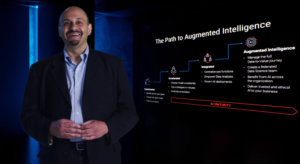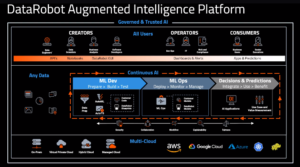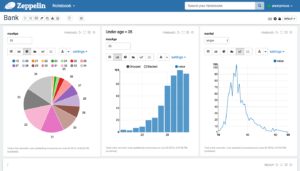

(Phonlamai-Photo/Shutterstock)
DataRobot unveiled several enhancements in its automated machine learning platform today, including the introduction of features like composable ML and continuous AI. The company, which is holding a virtual conference today and tomorrow, also bought Zepl, the data science notebook startup founded by the backers of Apache Zepplin.
During a session at DataRobot’s AI Experience Worldwide virtual conference, Nenshad Bardoliwalla, the company’s senior vice president of product, led attendees through a roundup of the company’s 2020 accomplishments, and laid out a roadmap for what DataRobot hopes to do in 2021.
“2020 was a busy year at DataRobot,” said Bardoliwalla, who joined DataRobot in late 2019 when it acquired Paxata, the data preparation company he co-founded. “Perhaps we had a little more time on keyboards, not having to commute during the pandemic.”
For starters, DataRobot completed the integration of the Paxata data prep tools, he said. It also rounded out its end-to-end data pipelines to support model training, inference, and continouous improvement, Bardoliwalla said.
“We enhanced AutoML significantly with the addition of visual AI to automate and democratize computer vision models, location AI to add geospatial awareness, and automated deep learning to help you try new approaches on your tabular text and your image data,” he told the audience. “We also added automatic feature discovery to automate the laborious and repetitive feature engineering activities from multiple related datasets into a single operation.”

DataRobot is on the path to delivering “augmented intelligence,” SVP of Product Nenshad Bardoliwalla said during today’s virtual conference
2020 also saw DataRobot bolster its time-series capabilities with automated anomaly detection; add support for Keras deep learning libraries; roll out new MLOps agents to support remote models; add a champion-challenger framework to stress-test ML models; introduce an application gallery; and roll out a value tracker for AI.
“I believe we set the bar high for innovation,” Bardoliwalla said. “And now we plan to surpass it.”
The company already rolled out its first new release in March with the launch of DataRobot version 7.0. That release brought enhancements in MLOps, model baseline comparison, computer vision, and data prep.
With today’s announcement, the company is once again bolstering capabilities across its expansive AI platform, including the introduction of what the company is calling “composable ML,” which Bardoliwalla called “another first in the field of data science and machine learning.”
Composable ML is a feature for the most advanced “code-first” data scientists that gives them more capabilities to tweak and tune their ML models, Bardoliwalla said.
“You’ll be able to copy, edit, and even reconfigure DataRobot’s blueprints to fit the specific needs of your use case and the best practices unique to your business,” he told the audience in today’s session. “Within any DataRobot blueprint, you’ll be able to integrate your own Python and R code to add new custom tabs into our model. You can even bring your own training models built from scratch by your best data scientists and run them in our head-to-head model competition. Once you see how they place on our leaderboard, you can decide which model” to use.
Meanwhile, the new “Continuous AI” feature is designed to bolster the DataRobot MLOps product to fine-tune the retraining policies for machine learning models.
“You will now be able to set automatic retraining policies for your production models based on a schedule of your choosing, or on the occurrence of a significant event, such as the detection of data drift or a dip in model accuracy,” Bardoliwalla said.
Continuous AI will leverage DataRobot’s champion-challenger framework to analyze the performance of production models and recommend when the model should be replaced. It’s all about automating the tasks that are mostly done manually by data science practitioners today, Bardoliwalla said.
“Just imagine how much time and energy you could have saved this time last year when Covid made everyone’s models inaccurate, forcing lengthy re-training and replacement projects,” he said. “Now your modes will stay accurate for as a long as they live in your production environment, no matter what crazy thing is going on across the world.”
This release also brings a new bias and fairness tool that monitors for disparate impacts by ML models. DataRobot has been at the forefront of tackling the bias concerns in AI, having produced the “State of AI Bias” report in 2019, and hiring a new Global AI Ethicist, Haniyeh Mahmoudian, three weeks ago. It also released a model grader, which is a new tool to evaluate existing AI models and generate an automatic scorecard grading them across data auality, robustness, accuracy, and fairness.
The company also debuted its no code AI app builder for practitioners who don’t want to write code in Python or R. The software presents a GUI that allows users to build ML models in a drag-and-drop fashion using widgets and pre-built templates.
Finally, DataRobot acquired Zepl, the Silicon Valley firm behind the open source Apache Zeppelin data science notebook. Zepl, which had raised $13.1 million, owns a cloud product that allows users to analyze data and develop ML models in the interactive Zepplin environment. The offering, which emerged from beta in 2018, works with multiple languages and production environments, including Apache Spark environments, such as Databricks’.
DataRobot says it will integrate Zepl as “a cloud-native, self-service notebook” in its AI environment. In addition to enabling users to build models in a notebook environment (similar to Jupyter), they’ll be able to collaborate with other data scientists using Zepl’s integration with DataRobot, the company says.
“We have always known that to lead the AI market, we must embrace all creators of AI systems, from analysts and citizen data scientists who prefer using a GUI to advanced data scientists who love to code,” said Dan Wright, who took over the CEO seat at DataRobot in March following the departure of co-founder Jeremy Achin.
“Through the addition of Zepl, we now give advanced data scientists more flexibility to use our enterprise AI platform within their existing workflows, including the ability to use their own code. By incorporating Zepl into the DataRobot platform, we plan to further democratize data science across every enterprise and significantly accelerate our code-centric roadmap,” he says.
The company’s AI Experience Worldwide continues tomorrow at https://aiworldwide.datarobot.com.
Related Items:
DataRobot Introduces AI-Powered Anti-Pandemic Initiative ‘ContagionNET’
DataRobot Eyes IPO After Another VC Haul
Apache Zeppelin Launches Latest Data Science Notebook
February 4, 2025
- MindBridge Partners with Databricks to Deliver Enhanced Financial Insights
- SAS Viya Brings AI and Analytics to US Government with FedRAMP Authorization
- Percona Announces Comprehensive, Enterprise-Grade Support for Open Source Redis Alternative, Valkey
- Alluxio Enhances Enterprise AI with Version 3.5 for Faster Model Training
- GridGain Enables Real-Time AI with Enhanced Vector Store, Feature Store Capabilities
- Zoho Expands Zia AI With New Agents, Agent Studio, and Marketplace
- Object Management Group Publishes Journal of Innovation Data Edition
- UMD Study: AI Jobs Rise While Overall US Hiring Declines
- Code.org, in Partnership with Amazon, Launches New AI Curriculum for Grades 8-12
- WorkWave Announces Wavelytics, Delivering Data-Driven Insights to Optimize Businesses
February 3, 2025
- New Relic Expands AI Observability with DeepSeek Integration
- LLNL Study Explores ML-Driven Binary Analysis for Software Security
- BCG: AI and Advanced Analytics Key to Cost Reduction for 86% of Executives
- EY and Microsoft Unveil AI Skills Passport to Bridge Workforce AI Training Gap
- DataChat Launches No-Code, GenAI Data Analytics Platform as Snowflake Native App on Snowflake Marketplace
- FICO Honors Amazon Team for Research on Large-Scale Delivery Network Optimization
January 31, 2025
- The Top 2025 Generative AI Predictions: Part 1
- Inside Nvidia’s New Desktop AI Box, ‘Project DIGITS’
- 2025 Big Data Management Predictions
- OpenTelemetry Is Too Complicated, VictoriaMetrics Says
- PayPal Feeds the DL Beast with Huge Vault of Fraud Data
- 2025 Observability Predictions and Observations
- The Top 2025 GenAI Predictions, Part 2
- Big Data Career Notes for December 2024
- Slicing and Dicing the Data Governance Market
- Why Data Lakehouses Are Poised for Major Growth in 2025
- More Features…
- Meet MATA, an AI Research Assistant for Scientific Data
- IBM Report Reveals Retail and Consumer Brands on the Brink of an AI Boom
- Oracle Touts Performance Boost with Exadata X11M
- Mathematica Helps Crack Zodiac Killer’s Code
- Dataiku Report Predicts Key AI Trends for 2025
- Anaconda’s Commercial Fee Is Paying Off, CEO Says
- AI Agent Claims 80% Reduction in Time to Complete Data Tasks
- Hitachi Vantara Urges Businesses to Invest in Data Infrastructure to Unlock AI Potential
- The Top Five Data Labeling Firms According to Everest Group
- Sahara AI’s New Platform Rewards Users for Building AI Training Data
- More News In Brief…
- Informatica Reveals Surge in GenAI Investments as Nearly All Data Leaders Race Ahead
- Gartner Predicts 40% of Generative AI Solutions Will Be Multimodal By 2027
- AI and Big Data Expo Global Set for February 5-6, 2025, at Olympia London
- NVIDIA Unveils Project DIGITS Personal AI Supercomputer
- Exabeam Enhances SOC Efficiency with New-Scale Platform’s Open-API Integration
- GIGABYTE Launches New Servers with NVIDIA HGX B200 Platform for AI and HPC
- Marvell Unveils Co-Packaged Optics for Custom Processors to Boost AI Server Interconnects
- Domo Partners with Data Consulting Group to Provide Advanced BI Capabilities to Global Enterprises
- Oracle Unveils Exadata X11M with Performance Gains Across AI, Analytics, and OLTP
- Dremio’s New Report Shows Data Lakehouses Accelerating AI Readiness for 85% of Firms
- More This Just In…





























